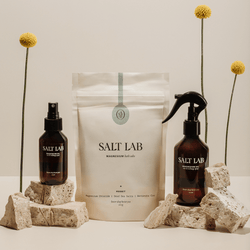Magnesium plays a powerful role in how we feel — from sleep and stress to muscle recovery and even skin health. To help us understand it a little better, we sat down with integrative medicine practitioner Dr Medina Culver to talk all things magnesium: what it does, how to know if you’re getting enough, and simple ways to work it into your daily routine.
1. Why is magnesium so essential for overall health, and what role does it play in the body?
Magnesium is one of those unsung heroes in our body. It's involved in over 300 processes, so it's pretty crucial. It helps with everything from making energy to keeping our muscles and nerves working properly. It’s also essential for things like regulating blood sugar, supporting a healthy immune system, and maintaining strong bones. Without magnesium, a lot of basic body functions wouldn’t work as smoothly.
2. What are the common signs of magnesium deficiency, and how can people tell if they need more?
If you're low on magnesium, your body will usually let you know. Some common signs are things like muscle cramps, feeling tired all the time, or even feeling a bit irritable or anxious. You might also notice things like trouble sleeping, headaches, or heart palpitations. If any of these sound familiar, it’s a good idea to check in with a healthcare provider to see if magnesium is the missing piece.
3. Can magnesium impact skin health, and could it play a role in conditions like acne or eczema?
Yes, magnesium can definitely affect your skin. It's anti-inflammatory, which is key for conditions like acne and eczema. Inflammation tends to make skin flare-ups worse, so magnesium can help keep things in check. Plus, magnesium is involved in collagen production, which is super important for healthy skin. If you’ve got issues with inflammation or skin conditions, magnesium might just be something worth looking into.
4. Are there specific lifestyle factors (e.g., diet, stress, exercise) that increase magnesium needs?
Absolutely. Stress, for example, really drains magnesium levels because your body uses more of it when you’re stressed. If you're working out a lot, you’re also losing magnesium through sweat, so your body may need more to recover. Plus, if you’re eating a lot of processed foods instead of whole, magnesium-rich foods, you might not be getting enough. So, things like stress, exercise, and diet all play a big role in your magnesium needs.
5. What are some misconceptions about magnesium that you’d like to clear up?
One thing I hear a lot is that magnesium supplements are necessary for everyone. But honestly, if you're eating a balanced diet with plenty of magnesium-rich foods—like leafy greens, nuts, and seeds—you may be getting enough. It’s not always about popping a pill. Another misconception is that magnesium only matters for older adults or people with certain health conditions. But honestly, anyone can be deficient, especially if they’re under stress or not eating well.
6. How can magnesium support stress management and nervous system health?
Magnesium has a pretty calming effect on the body. It helps regulate stress hormones like cortisol, so you’re less likely to feel frazzled. It also plays a role in neurotransmitters like GABA, which help the brain relax and ease into sleep. So, if you’re feeling stressed or having trouble unwinding at night, magnesium could help support your nervous system and make it easier to chill out.
7. What are your top tips for incorporating magnesium into a daily wellness routine?
I always recommend starting with your diet—foods like spinach, almonds, or pumpkin seeds are packed with magnesium. If that’s not enough, you can try supplements, especially forms like magnesium glycinate, which is easier on the stomach. Another thing I like is taking a nice, relaxing Epsom salt bath. Your skin can absorb magnesium, and it’s a great way to unwind. I also suggest trying magnesium in the evening—it can help with sleep, since it has a calming effect. Lastly, managing your stress with things like yoga or meditation can help keep magnesium levels in check, too.
8. Anything else you'd like to let us know that you feel you haven't mentioned?
Just that magnesium isn’t a one-size-fits-all solution. If you’re dealing with specific health issues or you're on certain medications, it’s always best to talk to your doctor before starting magnesium supplements. Too much magnesium can cause digestive issues, so it’s all about finding the right balance. But overall, magnesium is something a lot of people overlook, and making sure you’re getting enough could have a big impact on how you feel day-to-day.
To anyone looking to bring more rest, balance and calm into your routine, magnesium is a powerful place to start. Take a moment to explore our collection — and find what feels right for you.















